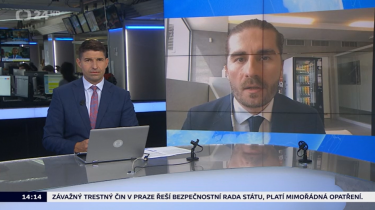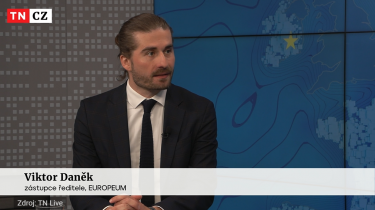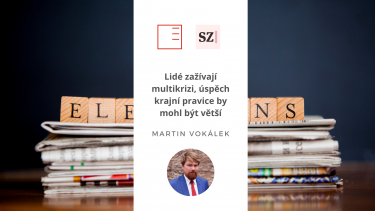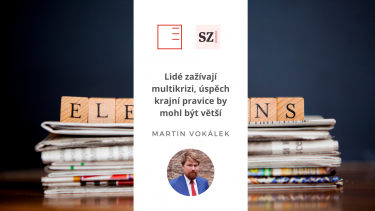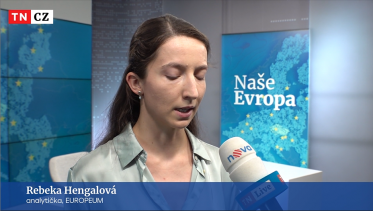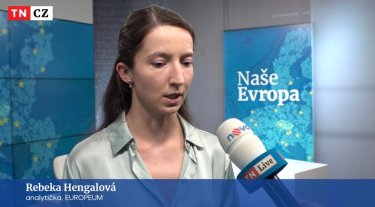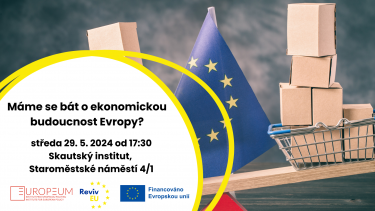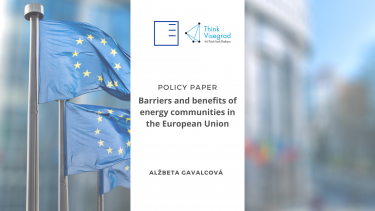ČT24 | Political shift after the European Parliament elections and its impact on the future of the EU
After the European Parliament elections, the strongest faction remains the European People's Party, a grouping that includes TOP09, KDU-ČSL and the Mayors and Independents. The Socialists and Democrats are second and Renew Europe, which includes the winning ANO party, is third. How significantly did the elections affect the European Parliament? Viktor Daněk, deputy director of EUROPEUM Institute, commented for ČT24.
Zjistit víceTN.cz | What do the results of the European elections indicate about the mood in Czech society?
How do the results of the European Parliament elections reflect the mood in society? Have predictions about the new composition of MEPs being predominantly right-wing been fulfilled? And what skills are essential for the success as a Member of the European Parliament? Viktor Daněk, Deputy Director of EUROPEUM Institute, comments in an interview for TN.cz.
Zjistit víceSeznam Zprávy | People experience multi-crisis, success of the far right could be greater
Despite the rise in support for the far right in most countries, the direction of the EU will not fundamentally change. The People's Party maintains its position as the strongest faction and gains support from centrist parties. The victory of the extreme right in the elections signals the strengthening of conservative and populist parties. However, it is expected that key issues such as the environment and migration will remain on the agenda. The election result does not signify a radical change but serves as a signal to focus on voters favoring conservative and far-right parties. Martin Vokálek, Executive Director of EUROPEUM Institute, commented on the results for Seznam Zprávy.
Zjistit více
Seznam Zprávy | Lidé zažívají multikrizi, úspěch krajní pravice by mohl být větší
I přes nárůst podpory krajní pravice ve většině zemí se směřování EU nezásadně měnit nebude. Lidovci si udržují pozici nejsilnější frakce a získají podporu od středových stran. Vítězství extrémní pravice ve volbách signalizuje posílení konzervativních a populistických stran. Přesto se očekává, že hlavní témata jako životní prostředí a migrace zůstanou na pořadu dne. Výsledek voleb neznamená radikální změnu, ale je signálem k zaměření se na voliče preferující konzervativní a krajně pravicové strany. Martin Vokálek, výkonný ředitel Institutu EUROPEUM, komentoval výsledky eurovoleb pro Seznam Zprávy.
Zjistit více
TV Nova | How does the Czech public view climate change and the development of renewable energy sources?
Before the upcoming elections to the European Parliament, a debate was held on TV Nova among the leading figures of the seven main political parties, movements, and coalitions. Discussions revolved around important issues such as the migration pact or the conflict in Ukraine. Rebeka Hengalová, a research fellow at EUROPEUM Institute, provided an analysis for TV Nova on how the Czech public views climate change and the development of renewable energy sources.
Zjistit víceTV Nova | Development of renewable energy sources
How does the Czech public view climate change and the development of renewable energy sources? Do they see it as a path to competitiveness? According to Czechs, should the European Union focus on environmental issues? Rebeka Hengalová, a research fellow at EUROPEUM Institute, discussed the STEM survey results in collaboration with the EUROPEUM Institute on the program "Naše Evropa" on TV Nova.
Zjistit víceRevivEU | Should we fear for the economic future of Europe?
We invite you to a public podcast recording focusing on the discussion of the impacts of the COVID-19 pandemic on European industrial policy and its potential consequences for the Czech economy and society. We will discuss the new technological dynamics resulting from the pandemic and explore ways in which the European Union can respond to technological competition with the USA and China.
Zjistit vícePolicy Paper | Barriers and benefits of energy communities in the European Union
Energy communities are an effective means to decentralize and renew our energy systems with sustainable solutions as they are usually based on renewable energy. They have already started emerging in 1970´s, yet there has been a significant increase in their development only in recent years, also in terms of their introduction into the EU legislation. Especially in Western and Northern European countries the concept already enjoys vast popularity. On the other hand, in Central and Eastern European countries (further referred to as CEE) energy communities are only beginning to emerge. The policy brief (based on literature and interviews with various stakeholders ) examines the benefits energy communities may bring, and more importantly, the main obstacles remaining in their way for greater evolution in the CEE region – and especially Visegrad countries (V4). As these initiatives progress, sharing the best practices will ensure the success of the community energy in the energy transition. Writes Alžbeta Gavalcová.
Zjistit víceTV Nova | European elections: Defense, security and domestic issues dominate amongst Czech voters
According to surveys a record turnout of Czech voters is expected in this year's elections to the European Parliament. Compared to the elections in 2014, it could be almost double the number, and so far about 33 percent participation is expected. Defense and security will be key topics, as well as war in Ukraine. Domestic issues of individual countries will play an important role as well. The executive director of the EUROPEUM Institute, Martin Vokálek, spoke to TV Nova about possible changes in the composition of the Parliament.
Zjistit více
TN.cz | European Commission to allocate hundreds of milions of euro to support ammunition production of EU manufacturers
Military industry in Europe is not able to cover the needs related to the supply of ammunition to Ukraine. The situation of the long-neglected EU weapons industry is now being addressed by the European Commission with financial support of 500 milion of euro. But is the decision on financial support coming too late? And how long before the industry can be renewed? Martin Vokálek, Executive Director of the EUROPEUM Institute, commented on the situation for TN.cz.
Zjistit více
Staroměstské náměstí 4/1
Praha 1 - Staré Město
110 00
tel.: +420 212 246 552
email: europeum@europeum.org
https://www.europeum.org
